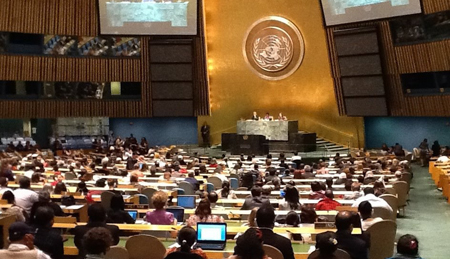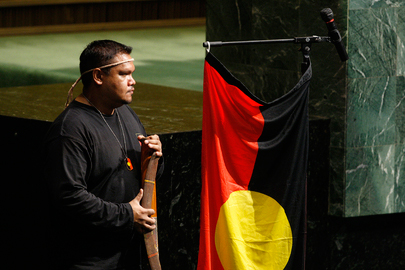
DIALOGUE BETWEEN NATIONS
UNITED NATIONS PERMANENT FORUM ON INDIGENOUS ISSUES

Photo Credit: Johnson Cerda
Opening of the Eleventh Session
United Nations Permanent Forum on Indigenous Issues
General Assembly
UN Headquarters, New York City
7 May 2012
Special Theme: The Doctrine of Discovery
Its enduring impact on indigenous peoples
and the right to redress for past conquests (articles 28 and 37
of the United Nations Declaration on the Rights of Indigenous Peoples)
| F I R S T W E E K A U D I O |
|
S E C O N D W E E K A U D I O |
|
Monday, May 7, 2012 Tuesday, May 8, 2012 Wednesday, May 9, 2012 Thursday, May 10, 2012 Friday, May 11, 2012 |
Monday,
May 14, 2012 Tuesday, May 15, 2012 Wednesday, May 16, 2012 Thursday, May 17, 2012 Friday, May 18, 2012 |
EDITORIAL
| Twenty years ago
the Spanish government inaugurated the Universal Exposition EXPO
92 in Seville inviting the world to participate in The Age of
Discovery which was to be a Celebración del V Centenario del
Descubrimiento de América, the 500th Anniversary of the
Discovery of the Americas. This event generated polemic
perspectives around the world, including Indigenous resistance
movements throughout the Americas in response to the
commemoration of what was in the most horrific terms, a
holocaust. The United Nations declared 1993 the International Year of the World's Indigenous People, and began to promote new partnerships to spur global efforts to help address problems of indigenous people in such areas as human rights, environment, development, education and health. When one asks the question, what has been a positive result of the United Nations’ initial action in support of Indigenous Peoples at the international level, twenty years later one can look at the eleventh Session of the UN Permanent Forum on Indigenous Issues today and the importance of it’s Special Theme: The Doctrine of Discovery and this in your face visibility – world, are you listening - of the ongoing injustices arising out of the international decrees set out within this document and other Papal Bulls. The holocaust is not yet over. In 1992, nor in 1993, the United Nations Permanent Forum on Indigenous Issues did not exist; nor would it have been possible to have held such a high level meeting on this topic. So here we are, in 2012, acknowledging the possibility of constructive change, with the opportunity in the Permanent Forum sessions and parallel side events to listen, to reflect and participate in solutions to transform and remove these medieval mindsets from our modern relationships between Indigenous Peoples and governments. What will be the living legacy of this eleventh session? I would like to take this opportunity to extend my best wishes to all for success in addressing this auspicious and historical moment towards the understanding of the origins of painful racist and discriminatory marginalization of Indigenous Peoples, still prevalent in the 21st century global community. And I say, in solidarity: Basta! Time to embrace and move to a common future, the future we want, which is inclusive and based upon respect and compassion. Natalie Drache Editor-Publisher Dialogue Between Nations |
For all official information about this current session of the Permanent Forum, please visit the UN website for the Eleventh Session

Photo Credit:UN Photo/Devra Berkowitz
Australian aboriginal performer, Cameraon McCarthy,
stands with his didgeridoo, a traditional musical instrument,
at the opening of the eleventh session of the
UN Permanent Forum on Indigenous Issues (UNPFII)’s.
THE DIDGERIDOO CALLS THE ASSEMBLY TO ORDER!
News & Media
[01:08:08]
Opening of the Eleventh Session
of the United Nations Permanent Forum on Indigenous Issues
General Assembly
7 May 2012
DBN MEDIA COVERAGE
LISTEN TO DAILY AUDIO BROADCASTS OF THE
11TH SESSION OF THE UN PERMANENT FORUM
The dbn.tv team in Canada wishes to thank the UN Audio Library and the Recording Room for their collaboration in making these sessions available around the world.
| F I R S T W E E K A U D I O |
|
S E C O N D W E E K A U D I O |
|
Monday, May 7, 2012 Tuesday, May 8, 2012 Wednesday, May 9, 2012 Thursday, May 10, 2012 Friday, May 11, 2012 |
Monday,
May 14, 2012 Tuesday, May 15, 2012 Wednesday, May 16, 2012 Thursday, May 17, 2012 Friday, May 18, 2012 |
WE INVITE YOU TO BE IN THE GLOBAL DIALOGUE
LES INVITAMOS A QUE SE UNAN AL DIALOGO GLOBAL
S I T E M A P M A P A D E L S I T I O
dbn@dialoguebetweennations.com
Copyright Natalie Drache 1999